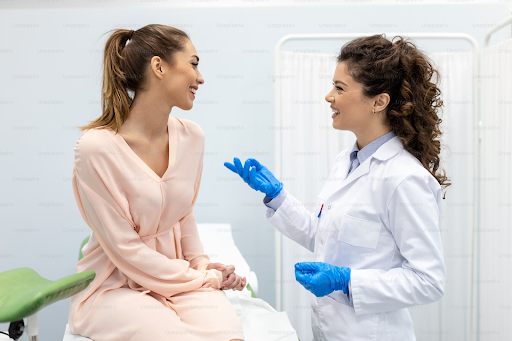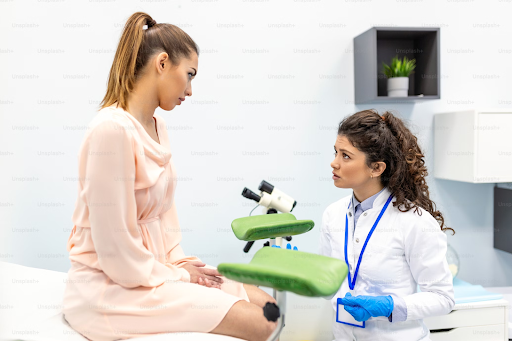At Atlanta Obstetrics and Gynecology Specialists, we recognize the critical importance of sexual health and the pressing need for accessible and confidential STD testing, including blood, urine, and swab samples, complemented by counseling to address any concerns.
The importance of STD testing is underscored by the recent statistics from 2022, which reported over 2.5 million cases of syphilis, gonorrhea, and chlamydia in the United States. What’s more alarming is the resurgence of syphilis and congenital syphilis, signaling a critical call for innovative solutions and collaborative efforts in STI prevention.
Our clinic is at the forefront of this battle, offering state-of-the-art testing services designed to detect, manage, and prevent the spread of sexually transmitted infections. Our commitment to your health is unwavering, as we bring over 50 years of experience and expertise to every patient encounter, right here in Atlanta.

STD testing is essential for several reasons. STDs are prevalent, and the absence of symptoms does not guarantee that an individual is free from infection. Many STDs can be asymptomatic, meaning they do not present any noticeable symptoms, making it possible for individuals to carry and transmit the infection without being aware of it. Therefore, making regular STD screening and STI tests a critical preventive measure
Highlighting the urgency of this issue, a 2018 study by the Centers for Disease Control and Prevention (CDC) found that the incidence rates of chlamydia, gonorrhea, and syphilis have been on the rise since 2014. Georgia was specifically identified as a major area of concern, ranking among the top 10 states with the highest STD rates—reporting nearly 225 more cases per 100,000 residents than the national average. This upward trend in STD rates further emphasizes the growing public health concern and the vital importance of regular testing to identify and address these infections promptly.
Trusting in monogamy alone as a safeguard against STDs can be misleading. Even in committed relationships, there’s a risk of STDs if either partner was previously exposed. Past relationships, undisclosed affairs, or other forms of close contact can introduce STDs into a monogamous relationship. Regular STD testing is crucial to ensure that both partners are free from undetected infections, thereby safeguarding the health of the relationship and preventing conditions that could complicate pregnancy or require specific medications.
The misconception that STDs can only be contracted through sexual intercourse ignores other modes of transmission. For instance, HPV can be transmitted through skin-to-skin genital contact, while congenital syphilis occurs when an infected mother passes the disease to her unborn child, leading to serious health risks for the baby. Individuals who have engaged in any form of intimate physical contact shared needles, or have had any exposure to blood products should consider STD testing.
At Atlanta Obstetrics and Gynecology Specialists, we offer STI testing to rule out infections, ensuring a comprehensive approach to sexual health that includes educating our patients on medicine and treatment options.
Infections like chlamydia and herpes can persist without noticeable symptoms, leading individuals to unknowingly spread the disease. For women, asymptomatic STDs pose a significant risk for conditions such as pelvic inflammatory disease (PID), which can result in infertility or ectopic pregnancy. Our clinic emphasizes the importance of regular STI screening to identify these hidden infections and provide timely treatment to avoid serious reproductive health complications.
Untreated STDs can escalate into severe health issues. For example, HPV is a leading cause of cervical cancer, and hepatitis B can evolve into chronic liver disease or liver cancer. Gonorrhea and chlamydia can cause infertility in both men and women. Through regular testing and early treatment, individuals can significantly reduce their risk of developing these serious conditions, highlighting the benefits of comprehensive STD screenings.
Being proactive about STI tests is a responsible practice that extends beyond personal health, reflecting a commitment to the well-being of one’s sexual partner. By ensuring you are free from transmittable STDs, you protect your partner from potential infections, thereby fostering a healthy and trusting relationship. This is particularly crucial in relationships where partners may not have been exclusively monogamous or have had multiple partners in the past.
The health implications of STDs during pregnancy extend to both the mother and the unborn child. Pregnant individuals face unique risks when it comes to STDs. Infections such as syphilis can lead to miscarriage, stillbirth, or neonatal death. Infants born with congenital syphilis may suffer from deformities, severe anemia, or liver and spleen disease. Testing during pregnancy is essential for the early detection and treatment of STDs, safeguarding both maternal and neonatal health. Our doctors recommend specific STD tests as part of routine prenatal care to prevent adverse outcomes.
The terms “STI” and “STD” are often used interchangeably in discussions about sexual health, but they have distinct meanings. STI stands for Sexually Transmitted Infection, while STD refers to Sexually Transmitted Disease. Understanding the difference between these two terms is crucial for accurate communication and awareness regarding sexual health.
An STI is the initial infection caused by bacteria, viruses, or parasites transmitted through sexual contact. Not all STIs develop into diseases; many remain in the body without causing serious health problems or symptoms. For example, someone might contract HPV (Human Papillomavirus), which could remain dormant without leading to any health issues. The term STI emphasizes the infection aspect, highlighting that an individual can be infected without necessarily being ill or exhibiting symptoms.
On the other hand, an STD is the result when an STI progresses to a more serious stage, leading to symptoms or illness. For example, if Chlamydia isn’t treated, it can turn into an STD by leading to pelvic inflammatory disease (PID), which can be pretty serious. Talking about STDs highlights when an infection has led to noticeable health problems.
The move from talking about STDs to STIs in health conversations shows we understand more about these conditions now. It points out that not all infections turn into diseases and shows how important it is to catch and treat STIs early. Catching STIs early can stop them from turning into STDs, which is why it’s so important to get tested regularly and practice safe sex. Knowing the difference helps with prevention, and treatment, and lowering the stigma around these conditions, making more people likely to get tested and treated.

Choosing the right STD clinic for testing and care is a decision that significantly impacts your health and well-being. At Atlanta Obstetrics and Gynecology Specialists, we are committed to providing the highest standard of care in a supportive and discreet environment. Here’s why our STD clinic stands out:
With over 50 years of experience serving the Atlanta community, our clinic has consistently been recognized for its excellence, including being named “Atlanta’s Best OB-GYN” by Atlanta Parent Magazine multiple times. Our medical team comprises healthcare professionals with extensive experience in STD testing and treatment. With qualifications that set industry standards, our staff brings not only expertise but also a deep sense of empathy to each patient interaction.

In our pursuit of excellence in patient care, we utilize the latest in diagnostic technology to provide accurate and fast results for a wide range of STDs. Our state-of-the-art laboratory is equipped to conduct a comprehensive STD panel test, ensuring that we can detect and diagnose with precision.
We prioritize your privacy and confidentiality above all else. Our STD testing center adheres to strict confidentiality protocols, ensuring that your personal information and test results are protected at every step of the process. From the moment you schedule your STD test to the time you receive your results, you can trust that your privacy is safeguarded.
Choosing our clinic gives you access to the top-tier Northside Hospital, renowned for its exceptional maternity services and advanced Women’s Center that delivers comprehensive healthcare. This affiliation ensures that you have access to the best medical care available.
We understand the importance of convenient healthcare access. That’s why we offer early appointment times, online scheduling, and access to your medical records through FollowMyHealth. We aim to make accessing top-quality care as straightforward as possible.
At Atlanta Obstetrics and Gynecology Specialists, we strive to ensure that your visit to our STD testing center is seamless, respectful, and informative. Here’s what you can expect from your experience with us:
Our first step involves a confidential consultation with our healthcare provider. This session is designed to offer comprehensive insights into STDs, their transmission methods, preventive measures, and available treatment options. It’s also an opportunity for you to voice any concerns or queries you might have regarding STD testing or your sexual health. Rest assured, we are here to provide you with all the information and support you need.
Following the consultation, we’ll proceed with collecting the necessary sample for testing. The type of sample required will be determined by the specific STDs being tested for. This could include blood tests, urine sample, swabs from the genital area, or other tissue samples. Our skilled medical staff will guide you through the sampling process, ensuring that it is conducted with the utmost care and respect for your comfort and privacy.
Your sample will then be sent to our specialized laboratory for detailed analysis. Our laboratory technicians utilize advanced techniques to detect the presence of any STDs accurately. This critical step allows us to diagnose any infections effectively, ensuring that we can provide you with the most appropriate care and treatment options based on the results.
Upon completion of the laboratory analysis, we will communicate your results to you in a timely and confidential manner. Should the results indicate an infection, your healthcare provider will discuss the findings with you in detail. We will explore all suitable treatment options and provide you with the necessary guidance and support to manage your condition.
At every step of the process, our focus is on ensuring that you feel supported, respected, and well-informed. Our team at Atlanta Obstetrics and Gynecology Specialists is dedicated to providing a safe and professional environment for all your STD testing needs.
Don’t wait to prioritize your sexual health. Contact Atlanta Obstetrics and Gynecology Specialists today to schedule your STD test. Our team is committed to providing comprehensive, compassionate care in a safe and confidential environment. Take control of your sexual health and schedule an appointment with us today. Remember, early detection through STD testing can save lives and protect you and your partners.
The frequency of STD testing is determined by several factors, including your sexual activity, number of partners, and any previous history of STDs. Our STD testing center recommends the following general guidelines:
Remember, these are general recommendations, and your specific needs may vary.
Testing positive for an STD is not uncommon, and there are steps you can take to manage your health:
At Atlanta Obstetrics and Gynecology Specialists, we are committed to providing you with the support, treatment, and information you need to navigate the process of STD testing and treatment. Our team is here to help every step of the way, ensuring you receive the care you deserve.
Atlanta Obstetrics and Gynecology Specialists will initiate a treatment program to help individuals meet weight reduction goals by administering Semaglutide. Semaglutide is a compounded medication like Ozempic, Wegovy. This program will be a minimum of 12 weeks. Call our office to see if you are eligible.